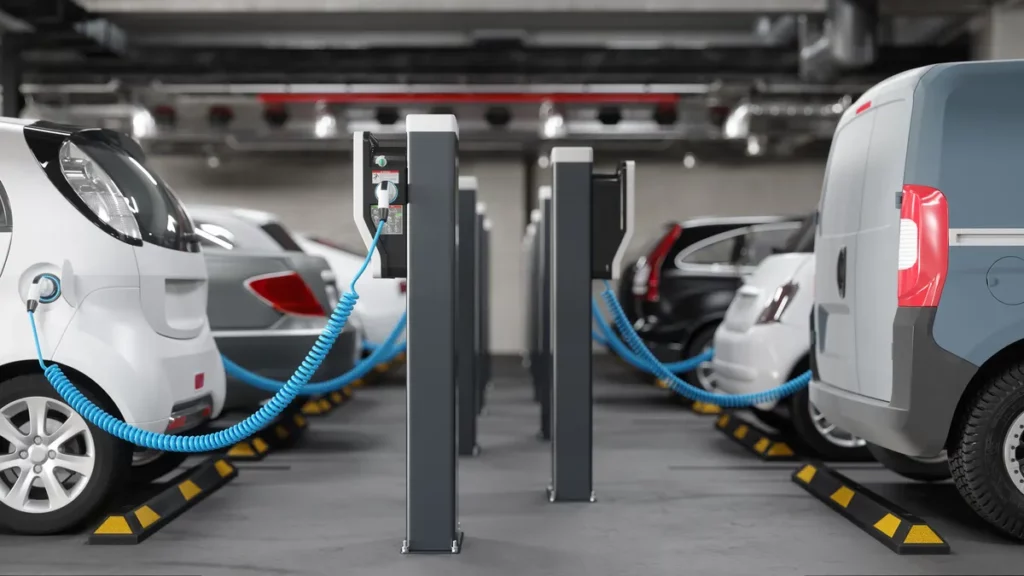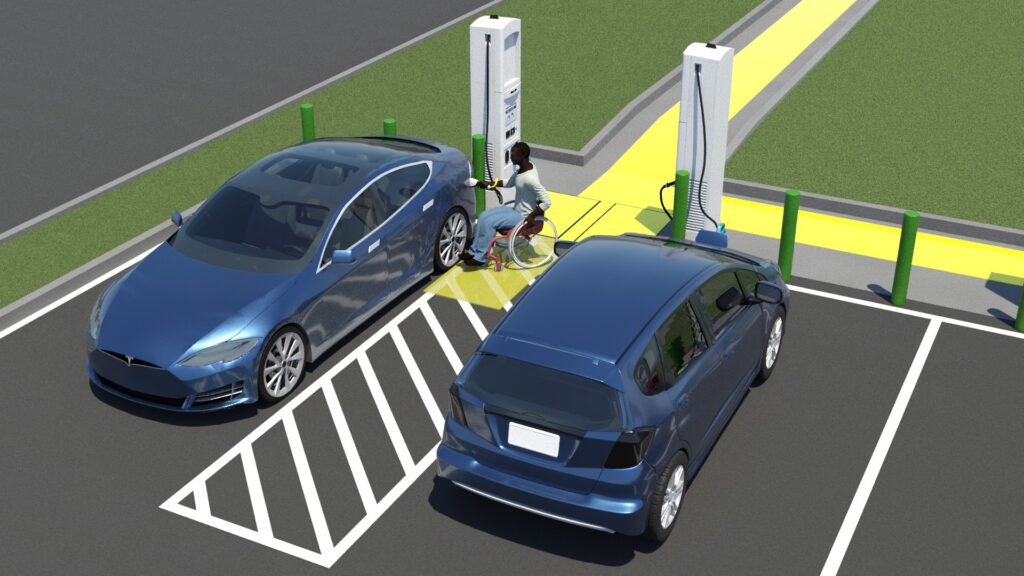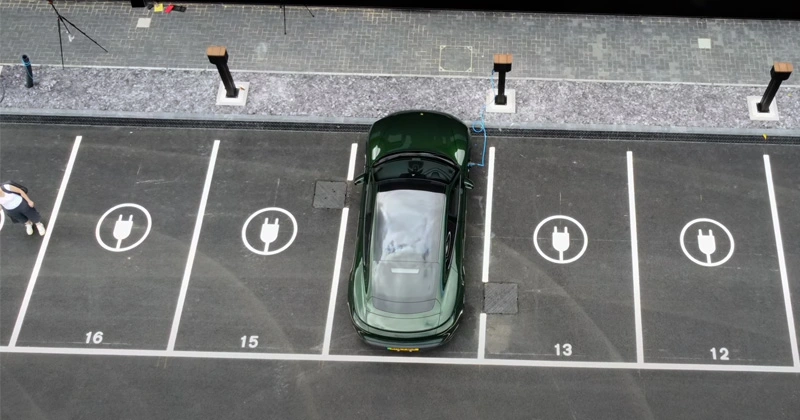As electric vehicle (EV) adoption skyrockets across New York City, the pressure is on for charge point operators (CPOs), site hosts, parking garage owners, installers, and turnkey EV charging service providers to stay ahead of the regulatory curve. With more than 90,000 new EV registrations in 2024 alone—and a statewide total surpassing 271,000—NYC has become a central player in the clean transportation movement. But with growth comes complexity.
From evolving building codes and charger quotas to fast-track permitting processes and accessibility mandates, understanding NYC EV charging regulations isn’t just a legal requirement—it’s essential for optimizing infrastructure investments and supporting New York’s ambitious climate goals.
Whether you’re expanding your network or just starting out, this guide breaks down the key rules, best practices, and real-world examples you need to navigate NYC’s dynamic EV charging landscape.
Making Room for EV Parking: What NYC Law Requires
New York has taken deliberate steps to prepare for the surge in EV ownership by ensuring new developments are built with charging infrastructure in mind.
Public Projects Must Be EV-Ready
Under New York Assembly Bill 622 (2023), any publicly funded construction project—including parking facilities with 50 or more spaces—must be EV-ready. These facilities are required to provide the electrical capacity to support Level 2 or DC fast chargers, with a minimum of 40 amps and 208 volts per space.
This regulation ensures the infrastructure is in place before chargers are needed, reducing future upgrade costs and supporting faster deployment of EV charging stations.
Private Developments Face Similar Mandates
Thanks to Local Law 55 of 2024, commercial buildings with 11 or more parking spaces must make at least 20% of spaces EV-ready, and 10% must include operational Level 2 or DC fast chargers. Notably, a single DC fast charger can fulfill the requirement for ten Level 2 chargers, giving developers flexibility in how they meet compliance.
These policies aren’t just forward-thinking—they build on a foundation set over a decade ago. Local Law 130 of 2013 mandated that parking facilities be built with future EV charging in mind, requiring pre-installed electrical capacity to reduce the need for expensive retrofits.
Together, these laws form a comprehensive framework for expanding the city’s EV infrastructure with long-term scalability in mind.
Real-World Example: NYC’s Largest EV-Friendly Garage
Implementation is already underway across the city. One standout example is the SP+ Parking Garage in Flushing, Queens—now one of New York’s largest EV-friendly facilities, boasting over 400 charging stations.
Developed in partnership with New Tech Energy, a turnkey EV charging services provider based in Brooklyn, this garage sets a new standard for scalability.

New Tech Energy’s work has been recognized by Con Edison for meeting rigorous EV infrastructure requirements.
A unique perk: drivers can charge their vehicles at no cost for parking while actively charging—an incentive that helps drive adoption and supports a positive charging experience.
Fast Permitting = Fast Charging: Streamlining EV Approvals
As demand grows, speed becomes critical. To reduce delays in charger deployment, New York has introduced a range of EV Charging Station Permitting Resources that guide municipalities on best practices, model ordinances, and planning strategies.
Published by NYSERDA (New York State Energy Research and Development Authority), these resources empower local governments, developers, and planners to fast-track installations without sacrificing safety or compliance.
Key Permitting Resources Include:
DC Fast Charger Streamlined Permitting Guidebook
Identifies permitting challenges and offers solutions, including accessibility and zoning considerations.
Promoting EV Charging Station Installations
A roadmap for planning boards to encourage charger integration in new developments.
Administrative and Planning Strategies for Local Jurisdictions
Policy tools to help local governments foster EV-friendly communities.
EV Ready Codes for the Built Environment
Explains how building codes can accelerate infrastructure deployment and encourage EV adoption.
These frameworks enhance predictability and reduce red tape—paving the way for broader, faster access to EV charging across NYC and the state.
NTEP: Ensuring Fair, Accurate, and Transparent Charging
As more drivers rely on public EV chargers, transparency in pricing and accuracy in billing are non-negotiable. In California, EV chargers are subject to CTEP (California Type Evaluation Program). While New York doesn’t have its own state-level certification, it relies on the national NTEP (National Type Evaluation Program) standard.
What is NTEP and Why Does It Matter?
Administered by the National Conference on Weights and Measures (NCWM), NTEP ensures that EV chargers used for commercial purposes meet rigorous standards for measuring and reporting electricity usage. The foundation of this program is NIST Handbook 44, which mandates how energy data and pricing must be displayed and calculated.
For CPOs and installers, NTEP compliance isn’t optional—it’s critical for:
- Building consumer trust
- Preventing billing disputes
- Avoiding regulatory fines
- Ensuring a consistent charging experience across networks
When a driver plugs in, they expect to pay for what they use. NTEP guarantees that’s exactly what happens—accurately, fairly, and transparently.
Accessibility in Action: ADA-Compliant EV Infrastructure
Accessibility isn’t just a legal checkbox—it’s a cornerstone of inclusive, user-friendly infrastructure. NYC EV charging regulations require compliance with the Americans with Disabilities Act (ADA), the Architectural Barriers Act (ABA), and, in some cases, Section 508 of the Rehabilitation Act.
The U.S. Access Board’s Design Recommendations for Accessible EV Charging Stations outlines critical elements for compliant installations.

Image courtesy of the U.S. Access Board
Key Permitting Resources Include:
- Accessible Parking Spaces: Designated spaces with enough room for mobility aids
- Unobstructed Access: Clear pathways to charging stations
- Accessible Operable Parts: Payment systems and interfaces designed for all users
- Signage and Wayfinding: Clear directions to accessible chargers
- Section 508 Compliance: Required for federally funded stations
By designing with accessibility in mind, CPOs enhance usability for all drivers and help create a more equitable transportation future.
Who’s Charging in NYC Parking Garages? Understanding Driver Segments
A recent analysis found that NYC has 5,377,375 parking spaces. This includes street parking, private garages, and paid parking garages. New York City has a very high density of parking garages, particularly in Manhattan, where they can be found on almost every block. There are more than 1,000 parking garages across Manhattan, ranging from small sites with just seven spots, to massive garages with thousands of spaces. Some have even installed lifts to stack cars and maximise capacity. NYC’s parking garage charging ecosystem must accommodate a diverse mix of EV drivers, each with unique needs:
1. Residential Monthly Parkers
These drivers benefit from EV-ready mandates in private developments but may face limited availability and high premiums in garages still working toward compliance.
2. Daily Residential Parkers
Without permanent parking, these drivers rely on public chargers. While NYC plans to offer chargers within 2.5 miles of all residents by 2035, demand still exceeds supply. DC fast charging hubs offer flexibility but don’t fully solve access gaps.
3. Monthly Transient Parkers
Commuters and professionals benefit from fast chargers in structured garages but often compete for limited spots—especially in commercial hubs like Midtown and Downtown Manhattan.
4. Daily Transient Parkers
Visitors and occasional drivers rely on public charging networks but often pay higher rates and face availability issues during peak hours.
A Note on Home Charging
Most EV drivers nationwide charge at home—but in NYC’s multi-family buildings, this often isn’t possible. This reality makes public and garage-based charging even more critical in the city.
Whether drivers are residents or transiets, monthly parkers or dailies, they expect a reasonably priced, user friendly EV charging solution abundant and available. As more and more people chose to buy EVs, acommodating different types of EV drivers while making it easy for parking garage operators to manage charging and process payments will become crucial.
Final Thoughts: Staying Ahead of NYC EV Charging Regulations
New York City’s push toward electrification is ambitious, necessary, and rapidly evolving. For charge point operators and property owners, understanding and adapting to NYC EV charging regulations is essential to staying competitive and compliant.
From legislative mandates and permitting reforms to measurement standards and accessibility rules, the roadmap is clear: the future of transportation in NYC is electric—and regulation is paving the way.
By staying informed and proactive, businesses can lead the charge. That means:
- Building EV-ready infrastructure
- Streamlining installation processes
- Ensuring transparency in billing
- Designing with accessibility in mind
Together, these actions not only ensure compliance but also improve customer experience, expand network reliability, and support NYC’s broader climate goals.
Looking to get ahead of the curve?
Contact Wevo Energy to learn how our smart EV charging management software can help you navigate NYC regulations, scale your infrastructure, and keep your operation future-ready.


